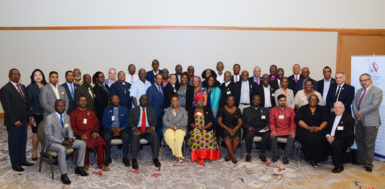A two-day consultative forum that brought together 55 religious leaders from 14 Caribbean countries has recommended that more attention be paid to actions that address the reduction of violence against women and girls and include men and boys and that best practices in the area of treatment and care as it relates to HIV/AIDS be supported.
The leaders, who represented the Christian, Muslim, Hindu, Baha’i and Voodoo religions, met at the Hyatt Regency Hotel in Trinidad and Tobago from February 1 – 2 with Pan Caribbean Partnership Against HIV and AIDS (PANCAP), United Nations and regional officials. The two-day forum was coordinated by the Planning Committee of Religious Leaders and PANCAP and focused on the theme, ‘Religious Leaders’ Contribution to the End of AIDS by 2030’.
According to a PANCAP press release, it is expected that the leaders would now establish a regional consultative group with the aim of working toward the implementation of the recommendations, which they would discuss for action with their national religious councils and provide a progress report to the regional consultative group by July 1.

Other recommendations that came out include supporting the 2016 UN High Level Political Declaration to fast-track the end of the AIDS epidemic by 2030. According to the declaration, global leaders have recognized that no country has ended AIDS and that no country can afford to step back from responding to HIV. Therefore, among other things, the declaration calls for the world to work towards reducing new HIV infections to fewer than 500,000 globally; reducing AIDS-related deaths to fewer than 500,000 globally and eliminating HIV-related stigma and discrimination all by 2020.
Along with this the religious leaders recommended promoting healthy living by placing emphasis on plugging the prevention gaps that include family values, age appropriate sexual education, and creative ways of communication and dissemination of information to reach various audiences.
The leaders also recommended that secure, sustainable, technical and financial resources for programmes led by religious groups be sought through shared responsibility and collaboration with government and non-governmental stakeholders and development partners, along with the exploration of the short and medium-term actionable recommendations of the PANCAP Justice For All Roadmap, especially insofar as they enable religious groups and organisations to effectively address the gaps in prevention and treatment interventions and continuing the dialogue on how to proceed with those elements yet to be resolved.
The establishment of the foundation for a Network of Religious Leaders interconnected with national focal groups to achieve a more consolidated approach to ending AIDS with a mechanism for effective communication and dissemination of information was also recommended. In addition, it was suggested that they seek to engage representatives of key populations including men who have sex with men, sex workers, injecting drug users and others in programmes aimed at identifying respective rights and responsibilities involved in the elimination of AIDS-related stigma and discrimination.
The leaders pledged that on their return to their home countries they will share information on activities initially using the PANCAP website and consider the possibility of follow-up consultations.
The PANCAP release said that Deputy Principal of the University of the West Indies, Cave Hill Campus Prof. Clive Landis, who addressed the forum, identified major scientific developments leading to the conclusion that anti-retroviral therapy (ART) delivers a life-saving benefit to persons living with HIV by abolishing end-stage AIDS. He told the religious leaders that the scientific breakthrough of the decade showed that persons living with HIV who achieve viral suppression on ART are non-infectious. Therefore, an important avenue to ending AIDS called for removing societal barriers that stand between persons living with HIV and effective ART treatment, hence the importance of eliminating stigma and discrimination.
Part of the aim of the two-day forum was to use the targets of the 2016 UN High Level Meeting Political Declaration as guidelines for action and to agree on the role religious organisations can play to promote healthy living and well-being for all ages in the region.





